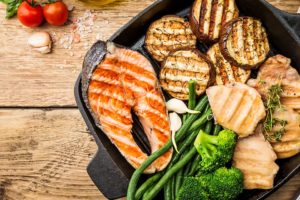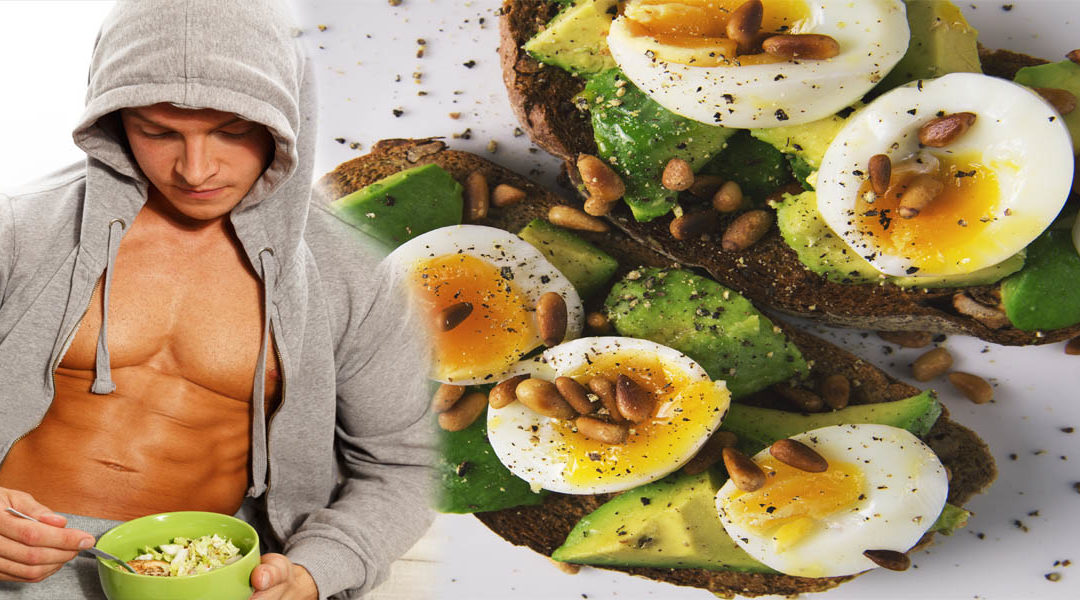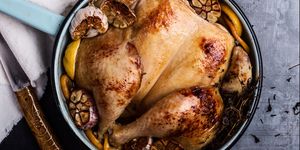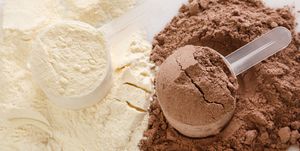Not sure how much protein you need or how to get it? Here’s your guide to this powerful, essential nutrient.
- The best protein for runners is a complete protein, such as chicken, beef, pork, or edamame.
- Spreading out protein consumption throughout the day, both before and after running, is more beneficial than consuming it all at once.
- Research published in Medicine & Science in Sports & Exercise found that consuming a high-protein diet helped people run faster than those who ate less.
We all know that protein is an important part of a healthy diet. But knowing why, how much, and when is the optimal time for intake throughout the day for peak performance is a little bit trickier. Let’s break it down.
What is Protein?
Protein is an essential nutrient that provides four calories per gram. It’s a part of every cell and makes up about 16 percent of the body, explains Leslie Bonci, R.D., founder of Active Eating Advice, nutrition consultant for the Kansas City Chiefs and Carnegie Mellon University athletics. And it has a lot of responsibilities when it comes to maintaining the body. “Protein is a component of hormones, antibodies, and enzymes,” Bonci explains. “Protein acts as a buffer to maintain the body’s acid-base balance, it’s important for muscle protein synthesis, bone remodeling; it can control chemical reactions, carry messages from one part of the body to another, regulate fluid balance by allowing minerals and fluids to move into and out of cells, and transports oxygen to the body.” It’s no wonder that protein is an essential part of our daily diet.
A complete protein contains all of the nine essential amino acids our bodies need but don’t create naturally, so they must be consumed through our diet. Complete proteinsare often animal-based foods such as poultry, beef, pork, veal, lamb, eggs, milk, yogurt, cheese, but also soy milk, tofu, edamame, and veggie burgers made from soy.
Incomplete proteins, which don’t contain all nine amino acids, can be combined with another food to create a complete protein, explains Bonci. “Foods such as rice and beans, beans and nuts, seeds and hummus, grains and nuts like peanut butter on bread, are all examples of incomplete protein combinations that can create a complete protein,” she says. “Combined, they contain all nine essential amino acids.” Other incomplete proteins include foods such as vegetables, grains, beans, nuts, and seeds.
[Related: The Best Protein Powders That Speed Up Recovery for Women]
How Much Protein Do You Need?
According to the Institute of Medicine, the dietary reference intakes for protein are 0.8 grams of protein per kilogram of body weight, or 0.36 grams per pound. And for endurance athletes, that number increases. Several studies on the protein requirements for athletes recommend intake that’s generally closer to 0.6 to 0.8 grams of protein per pound body weight.
“With the breakdown that endurance athletes can experience, and perhaps the over-reliance on carbs and inadequate protein intake, the need for protein increases,” Bonci explains. For example, a 130-pound runner needs between 78 to 104 grams of protein per day and a 195-pound runner needs 117 to 156 grams of protein daily.
[Build a killer midsection in the kitchen for effortless miles on the road with Eat for Abs!]
Does Protein Powder Benefit Runners?
Because it’s not always easy to meet these requirements with food, supplementation in the form of protein powder is okay. When it comes to protein supplements, the options are animal protein powder versus plant protein powder.
Animal protein powders are whey, casein, or egg protein. Plant-based protein powders are generally made up of pea, hemp, rice, and soy. Just as with complete proteins versus incomplete proteins in food, the same holds true for powders. The animal protein powders are complete proteins. Plant protein powders generally have more than one type of protein in it—whether that be rice and pea, rice and hemp, pea and hemp, or another combination—which makes it a complete protein.
So why pick one over the other? Some people find that animal protein powder can be more difficult to stomach, while plant-based protein is digested more slowly. Bonci recommends whey protein post-exercise. “Whey protein isolate is the highest in leucine, the amino acid most involved in muscle protein synthesis and repair, which is what you’re looking for post-workout” she says. For vegans and vegetarians: “Soy protein isolate is fine, too, but has less leucine and the rice and pea blends are also lower in leucine as well,” she says.

When planning your daily meals, Bonci recommends trying to evenly distribute protein intake throughout the day. So for example, the 130-pound runner who needs 75 to 100 grams of protein per day should try to get about 20 to 25 grams at each eating occasion. To help you plan ahead, Bonci created the following sample meal plans to help provide plenty of lean protein to fuel your mileage.
135-pound runner
Breakfast: 20 grams of protein
- 1/2 cup oatmeal mixed with 1 cup Greek yogurt
- 1 medium banana
Post-run recovery snack: 20 grams protein
- 16 oz. protein shake made using:
– 8 oz. skim milk
– 1 cup frozen berries
– 1 cup ice
– 1/2 scoop of whey protein isolate
Lunch: 25 grams of protein
- 1 cup vegetable soup
- Caesar salad topped with:
– 3 oz. chicken breast
– 1 Tbsp. parmesan cheese - 1 whole grain dinner roll
Dinner: 25 grams protein
- 3 oz. grilled salmon
- 1 cup steamed broccoli
- 1 small baked potato topped with:
– 1 Tbsp. low-fat sour cream
Total protein intake: 90 grams of protein
195-pound runner
Breakfast: 31 grams of protein
- 1 whole grain bagel topped with:
– 2 Tbsp. peanut butter
– 2 Tbsp. jam - 1 medium apple
- 6 oz. Greek yogurt
Post-run recovery snack: 35 grams of protein
- 16 oz. protein shake made from:
– 8 oz. skim milk
– 1 cup ice
– 2 Tbsp. almond butter
– 1 medium banana
– 2 scoops whey protein powder
Lunch: 31 grams of protein
- Club sandwich made with:
– 2 slices whole grain bread
– 3 oz. deli turkey
– 1 slice Canadian bacon
– Lettuce and tomato - Garden salad topped with:
– 2 Tbsp. low-fat shredded cheese
Dinner: 31 grams of protein
- 3 oz. grilled pork tenderloin
- 1 cup whole wheat pasta topped with:
– marinara sauce - 1 cup steamed mixed vegetables
Total protein intake: 128 grams of protein
A true love for sports








Recent Comments